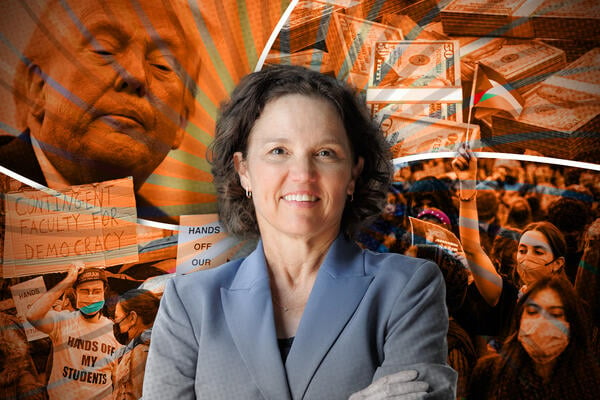by Rebecca Turner, Jennie Winter & Nadine Schaefer


Student voice is firmly embedded within the architecture of universities, with multiple mechanisms existing through which we (as educators) can ‘hear’, and students can ‘leverage’ their voice. The notion of student voice is widely debated (and critiqued – see Mendes & Hammett, 2023), and whilst relevant to this blog post, it is not what we seek to focus on here. Rather we focus on one of the primary figureheads of student voice within universities – the sabbatical officer – and consider how they are empowered to represent the ‘voice’ of their peers to their university.
Sabbatical officers are elected by the student body to represent their interests to the wider university community. They are leaders and trustees of their student union – semi autonomous organisations that operate alongside universities to advocate for the student body (Brooks, Byford & Sela 2016). As elected student representatives, sabbatical officers sit on high-level university committees where student voice is ‘required,’ making the rapid transition from a student in a lecture hall, to a voice for all. Though this is an anticipated move, it is potentially challenging. Becoming a sabbatical officer is the accumulation of a hard-fought election campaign, which commonly builds on several years of working with their students’ union alongside their undergraduate studies (Turner & Winter, 2023).
In collaboration with the NUS, and with the support of a small grant from the Staff and Educational Development Association (SEDA), we undertook a national survey to develop contemporary insights into the work of elected sabbatical officers. Sabbatical officers were clearly keen to share their experiences as we achieved responses from 59% of student unions affiliated to the NUS. We also undertook interviews with a sample of sabbatical officers (n=4) and permanent student union staff (n=6) who supported them during their time in office. Here we reflect on headlines emerging from this study, to place a brief spotlight on the work of sabbatical officers.
What a busy year (or two!)
Sabbatical officers were often negotiating multiple, potentially competing, demands – as this survey respondent reflected when invited to comment on the main challenges they faced:
‘Getting up to speed with the fast-moving world of [being] a sabbatical officer and the many roles I had (sabb, trustee, leader, admin and campaigner)’.
Sabbatical officers had a long list of responsibilities, including jobs inherited from their predecessor, union and university commitments, as well as the commitments they made through their own manifestos. Attending university committees to give the student voice took considerable time, with many questioning the value of the time spent in meetings:
‘It’s very much the case that you are in a room for two hours where you will be speaking for, I don’t know, two minutes. So sometimes it seems very boring to get involved with those random conversations which have very little to do directly with student experience.’ SO1
It was a common theme that sabbatical officers were silent during these meetings, waiting for the brief interlude when they were invited to speak. Leading us to question both where their agency as student representatives lay in these committees, and how they could effect change in this space, when their engagement was limited. A concern shared across survey respondents, for example:
‘I’m in a huge number of meetings which significantly reduces the amount of time I have to work on manifesto objectives.’
With a jobs list (and a diary) that echoed that of many Vice Chancellors (though with considerably less experience in HE), sabbatical officers reported engaging in trade-offs for who they worked with, whose voice was heard and opinions sought, to balance the demands of their role. As this sabbatical officer reflected, this could leave the wider student body questioning their actions:
‘[Students] want to see the battle happening. What they don’t want to see, is me sit for three hours and hash out the middle ground with some members of staff who probably aren’t going to change their mind.’ SO2
Finding their voice
Though given a seat at high level tables, respondents did not always feel at ease speaking up, the sentiments of this respondent were repeated many times in our data:
‘I think the hardest part is, we are sitting on committees with individuals who have worked here for years. We’re never going to have that same knowledge, so that makes it quite a challenge um to be able to understand the ins and outs of the university and the institution, and the politics.’ SO3
We did question whether the expectation to engage in these spaces may further reinforce the inequalities in student leadership highlighted by Brooks et al (2015). However, sabbatical officers were not working alone. Permanent officers played an important role, helping them, for example, to decode paperwork and plan their contributions. Leadership allies, who may, for example, provide early access to meeting paperwork to aide preparation, or coach sabbatical officers in advance of meetings, assisted sabbatical officers to find their voice:
‘I think the university has been really accommodating giving me the heads up on things that I could then have a bit more time to read up on things and to improve my knowledge.’ SO4
Developing effective support networks was essential; through these networks they gained the knowledge needed to contribute confidently in ‘university’ spaces. However, this took considerable time and resulted in many reprioritising their work. They focused on activities deemed essential (which were many!) with other areas of the work being streamlined to ensure promised commitments could be fulfilled (Turner & Winter, 2023).
The time taken for sabbatical officers to get up to speed was discussed at length by those serving a second term, which as this respondent noted, was ‘when the real work got done.’ They had learnt the ropes, and as another Sabbatical Officer (SO) reflected:
‘There’s a lot of stuff [to learn] when you come into this role. I think sabbatical officers do well if they are re-elected because they’ve had to learn a lot.’ SO2
‘Knowing the route to achieve my goals’
Our data captured the committed and driven nature of this (overlooked and overworked) constituent of the HE community. Though working in challenging circumstances, they embraced opportunities to influence policy and practice. Successes were based on the support they received and the strategies they developed to undertake their work. The value of an effective handover from their predecessor cannot be overlooked and permanent student union staff provided much needed continuity and support. Sabbatical officers drew on their student representatives to provide the eyes on the ground and engaged with senior leaders to develop their understanding of how universities work and through these individuals they grew in confidence to speak in front of diverse audiences. As individuals, many respondents performed their roles with tenacity, approaching their work both pragmatically and innovatively. Yet the time limited nature of this role added pressure and delineated what could be achieved:
‘Knowing the route to achieve my goals was difficult because it requires knowing what exactly you want before you’ve even started the job [so that you can] achieve what you want in year.’
This prompted us to question the sustainability of the sabbatical officer role; realistically who can manage, at this early stage in their career, the breadth of demands placed on them for more than a short period of time?
Promoting the voice of sabbatical officers?
As pedagogic researchers, we have a final, curious observation to make regarding the dearth of systematic research into this field of HE. Student unions have a long history; reference is still made to the activism and uprise of the 1960s (Klemenčič 2014). As a community we lament how student voice activities have become the realm of quality assurance, and question whether students have become politically apathetic (Raaper, 2020). The re-positioning of student unions has increased accountability and encouraged partnership working with their affiliated university (Brooks et al, 2016; Squire 2020). This leads us to question how relevant it is to continue to look backwards and talk of how students’ unions used to operate in the past. As the sector becomes increasingly diverse and how students engage with HE becomes more fragmented, we need to play closer attention to students’ unions to ensure they are supported to function effectively and represent the interest of students.
Dr Rebecca Turner is an Associate Professor in Educational Development at the University of Plymouth, UK. Alongside her interest in student voice and representation, Rebecca’s research addresses themes relating to inclusivity, student success and widening participation.
Professor Jennie Winter is Dean of Teaching and Learning and Professor of Academic Development at Plymouth Marjon University, a National Teaching Fellow, and a Principal Fellow of the UK Higher Education Academy. She holds numerous external roles, contributes to international pedagogic research, and her work has been utilised by the European Commission and presented globally.
Dr Nadine Schaefer is an Educational Developer at the University of Plymouth. Her research interests include student voice, student engagement and wider quality assurance issues in HE. Nadine is a Senior Advance HE Fellow (SFHEA).


